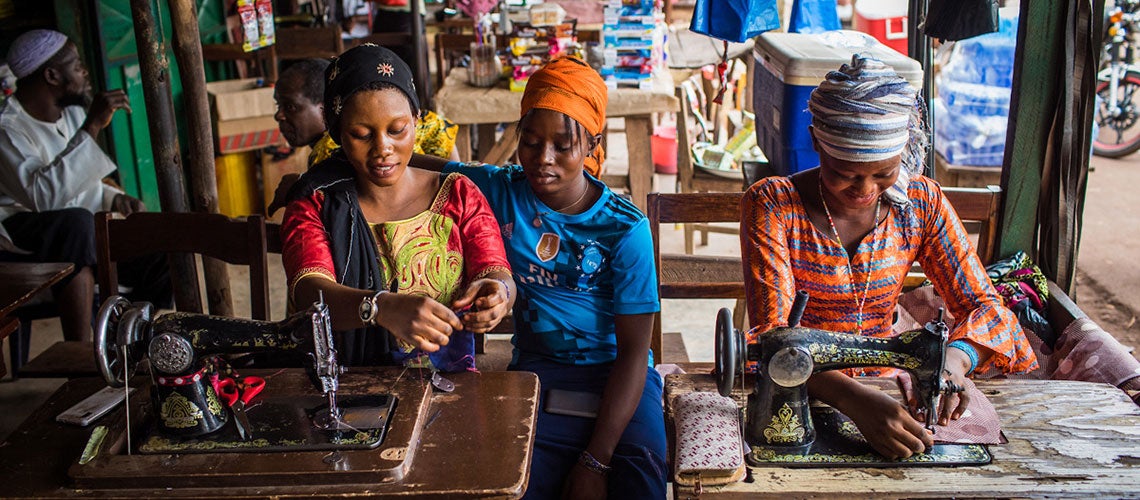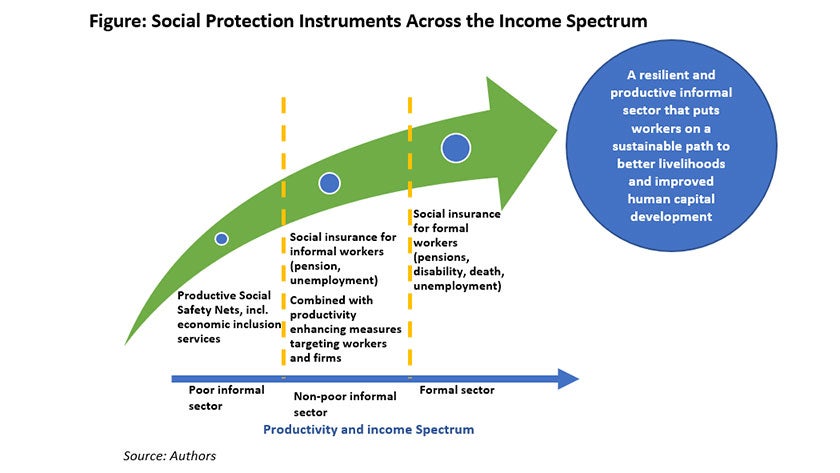 Young women work at sewing clothes in the market. Photo credit: Vincent Tremeau /World Bank
Young women work at sewing clothes in the market. Photo credit: Vincent Tremeau /World Bank
Accounting for 80.8% of jobs, the informal sector is the main source of employment and the backbone of economic activity in urban Africa. The vibrancy of the informal sector is difficult to miss in African cities: street vendors are key in ensuring food security. Those who work in transport keep the city and the economy moving. And those operating in services are critical to the overall incomes and functioning of African cities.
The urban informal economy is particularly common among youth (95.8% ages 15-24) and women (92.1%), and is an important contributor to poverty alleviation. Social protection plays a key role for business owners and workers to build human capital, prevent the sale of productive assets in case of shocks, and promote savings to build resilience.
The pivotal role of the urban informal sector is expected to continue in the foreseeable future in light of Africa’s growing population. The size of the working age population in the region will increase by 224.0 million by 2030 and 730.4 million by 2050. While this creates opportunities for economic growth, the (urban) formal wage sector is not creating sufficient jobs to absorb all new entrants and those migrating from rural to urban areas.
Vulnerability of women & men toiling in the region’s vast informal economy is highlighted by COVID-19
With no access to social protection and meager or no savings to fall back on, the COVID-19 (coronavirus) pandemic has been decimating informal workers’ livelihoods. A recent World Bank survey concluded that jobs in urban areas are particularly affected; during April-June 2020, 56.3% and 29.4% of urban respondents respectively in Nigeria and Uganda indicated that they stopped working because of COVID-19, against 39.2% and 11.1% in rural areas. Without assistance, many risk slipping into poverty. Also, living in informal settlements exposes them to increased health and social risks, further hindering their productivity.
Informal businesses are typically characterized by low productivity, resulting in low and irregular earnings. This is aggravated by a lack of access to basic services such as water and electricity, a dedicated space to operate, and access to high-value markets. Informal businesses are typically not financially included, and therefore unable to make reliable business transactions, access credit for productive investments or to reliably save to prepare for unforeseen risks.
Rethink strategies to provide social protection and to enhance the productivity of urban informal sector
The delivery of emergency cash benefits has been the most effective response for short-term relief. Looking to the future, however, governments should put in place coordinated policies to protect informal workers through instituting a three-pronged strategy: in addition to social safety net programs, which today exist in one form or another in most Sub-Saharan Africa countries, innovative social insurance plans, and productivity enhancing measures across the income spectrum are needed to support the urban informal sector. (Figure).

Tailor social protection instruments to the urban informal sector
For poor informal workers, cash transfers could be linked with services such as those that promote economic inclusion to support recipients eventually rise as self-sufficient members of the community. This messaging is important from an individual perspective to provide the right behavioral incentives as well as from a political economy perspective given that governments may not be willing or can afford to commit to cash transfers to work-able individuals unless there is a convincing exit strategy.
For non-poor informal workers, social insurance is the most appropriate instrument to offer protection to key shocks. Social insurance programs allow informal workers build short-term savings (for spells of unemployment) and long-term savings (to provide higher levels of income protection in old age). Access to risk management instruments is crucial to achieve a smooth consumption path to mitigate the impact of shocks, and to enhance productivity by enabling informal workers to take more risks in their business decisions.
Overall, social protection interventions should benefit from digital technology in outreach and targeting, a modernized payment system infrastructure, and automated platforms such as integrated social registries that help assess which measures are suitable to strengthen the resilience and productivity of various groups of informal workers.
Improve livelihoods by increasing productivity
While often a government priority, programs aiming at formalizing micro- and small enterprises have not proven effective. Increased productivity would help informal businesses progressively move closer to the formal sector, while improving their workers’ livelihoods. This requires strategic partnerships: Financial inclusion should focus on facilitating access to financing instruments tailored to the needs of the urban informal sector. ID systems are critical to facilitate such access. Childcare services, and mechanisms to link informal businesses with established value chains should be at the core of economic development strategies. And urban development strategies need to incorporate improved access to basic services.
Combined, social protection and productivity enhancing measures would thus increase the resilience of the urban informal economy to weather future shocks. This would bring countries on a path to a more resilient and productive informal sector that puts workers on a sustainable pathway to better livelihoods.



Join the Conversation